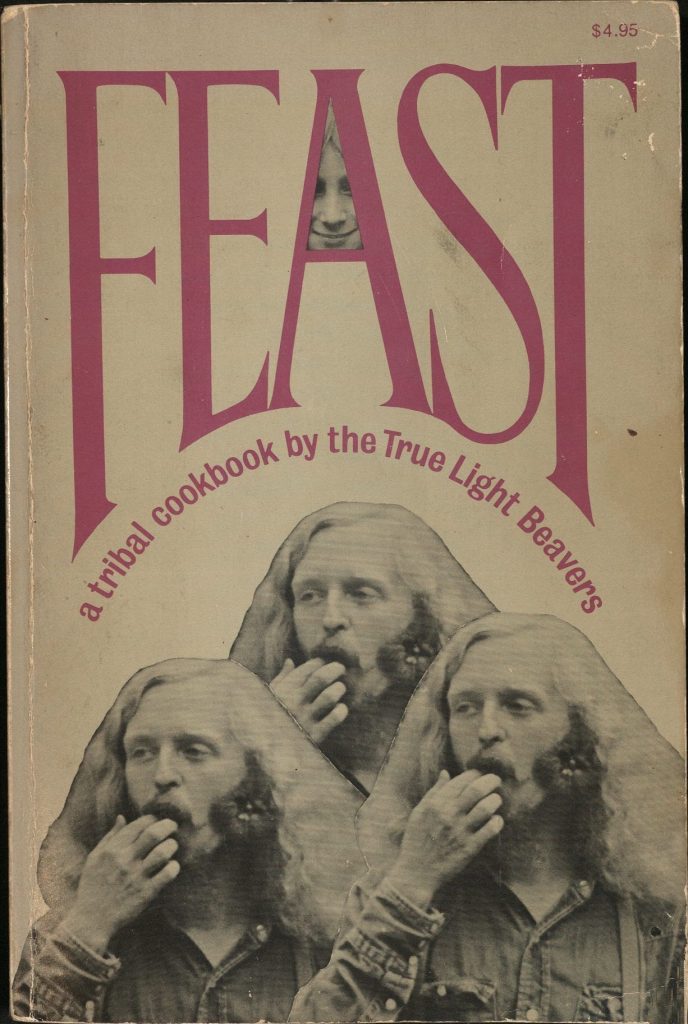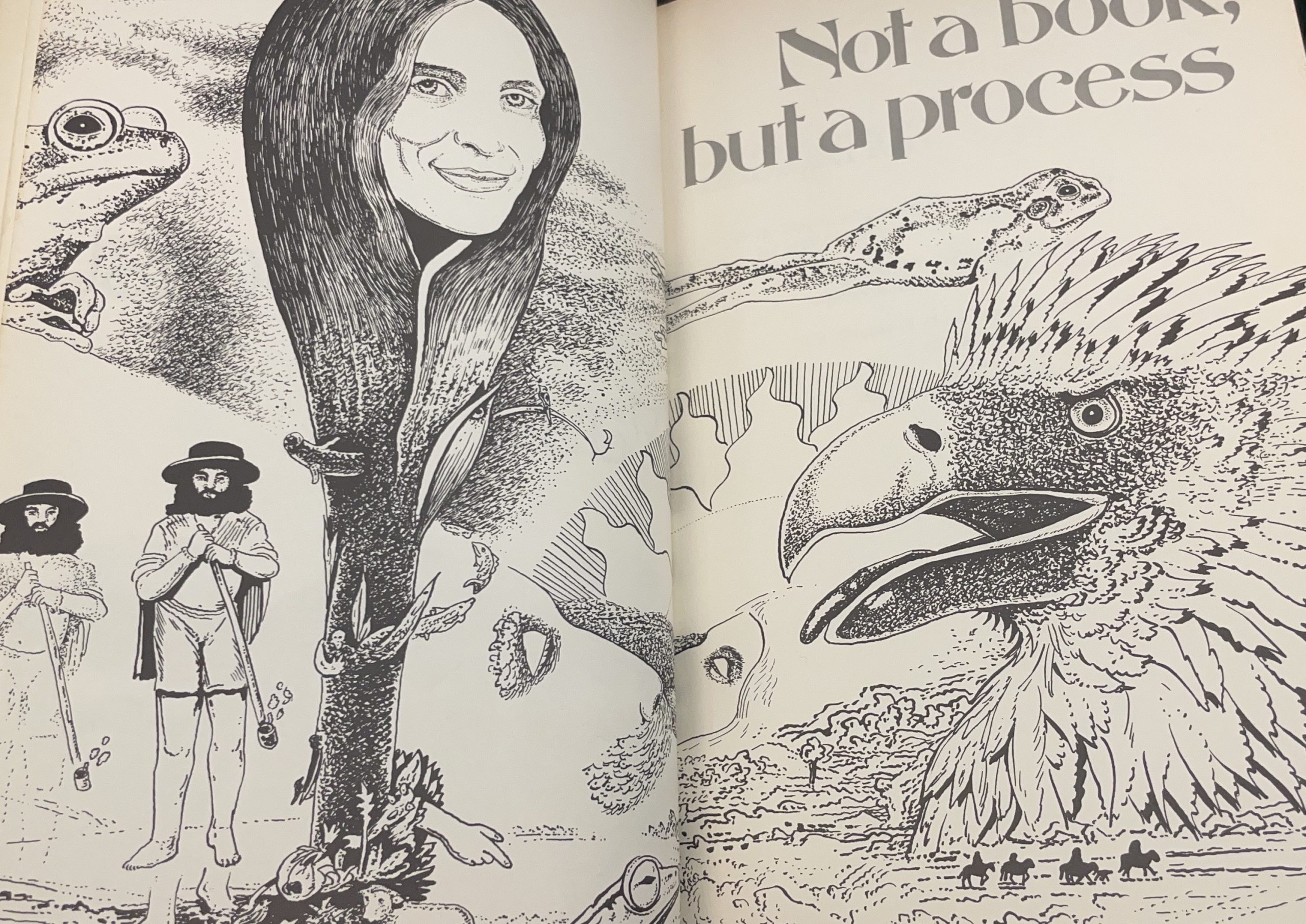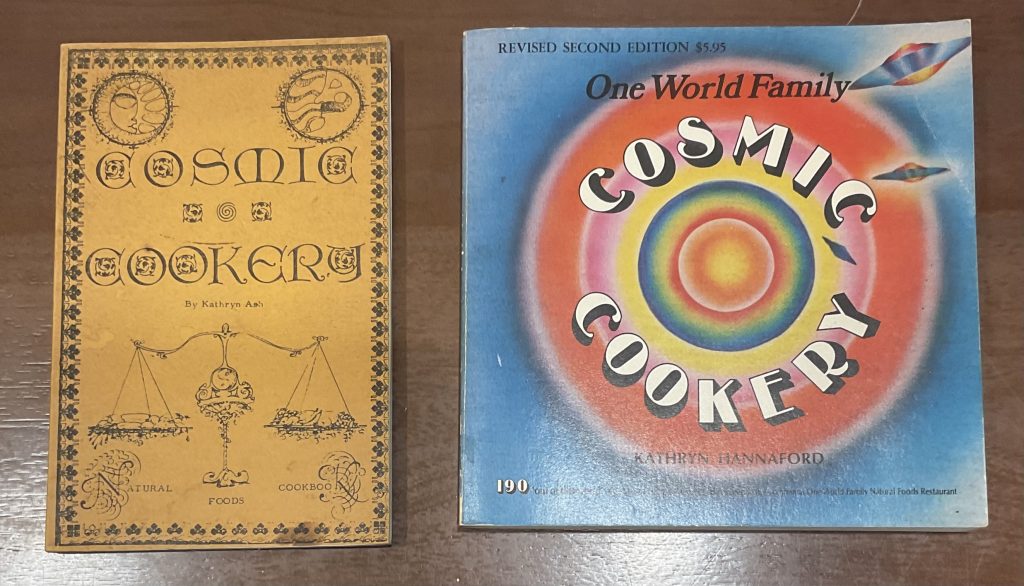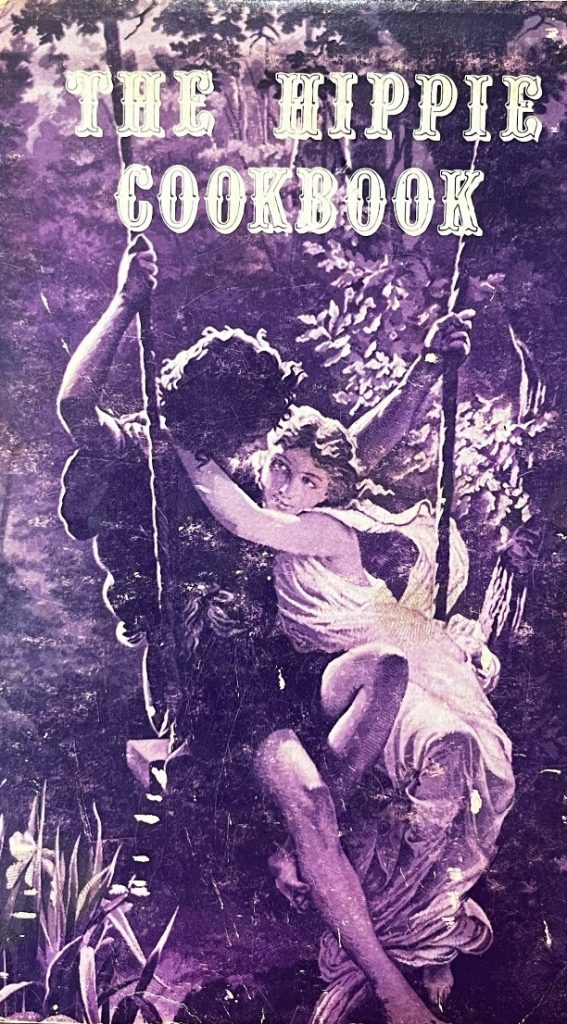Enjoy this post by Clare Levine, one of our Special Collections Freshman Fellows for the 2023-2024 academic year.
Interested in applying? Find out about the 2024-2025 program here.
The second semester of my research has revealed a lot to me regarding American vegetarianism, but one thing is still clear: cults and communes are at the center of the vegetarian lifestyle in the 1960s and 1970s. While I focused on Stephen and The Farm in my last blog post, I would like to focus on a few other counter-cultural cookbooks this time. Feast, Cosmic Cookery, and The Hippie Cookbook will all get a spotlight in this blog post, as they help to tell the cool and various stories that explain the intersections between vegetarianism and commune life.
Feast is a really cool and odd cookbook that combines our two favorite topics: vegetarianism and drugs. Feast focuses on the commune called the True Light Beavers of Woodstock, New York. The cookbook starts with the phrase “not a book but a process,” emphasizing to the reader that it is working to do more than just share recipes.
Next, with what can be called crazy illustrations is a section called “Garden of Eatin’,”which focuses on the idea of simple vegetarian survival.
The cult part comes in when the idea of energy being absorbed directly from the Source comes in (what the Source is, I couldn’t tell you,) but it still relates back to vegetarianism. Feast states that if one
maintains a vegetarian diet, and refuses to kill an animal to then eat it, one can find
good eating and health easily. This idea relates to me, personally, as my great-grandmother, Fannie Shaffer, also didn’t like killing animals to eat them. Her solution was to open up the Vegetarian Hotel in the Catskills in the 1920s, and while she didn’t create a cookbook (although her son did!), I can see a connection here in ideology.
Then we have Feast’s connection to drugs. Our author states that mescaline was considered a drug good for the body and soul, although he calls it a medicine. He then continues his experience by saying he
fasted for days to help with his healing, another aspect that is shown in the cookbook’s page that says eat, fast, feast. The reason our author thinks that this illness happened was because he had not been keeping to a vegetarian diet, and he had been corrupted by so-called poison. Hence, the solution was full-out vegetarianism. There are plenty of recipes and tips for both in and out of the kitchen in Feas, but some that stand out are the recipes for blintzes and the potato section – potatoes being a
section that is usually a key point of vegetarian cookbooks.
Our next cookbook is Cosmic Cookery – One World Family, of which Special Collections
has both the first (1970) and second (1974) editions.
While four years is not a long time difference, there are so many stark differences between the two. The books themselves are different, with over three times the recipes and pages in the second than in the first, and the author herself turned from a vegetarian-believing woman to a slightly crazed woman. The first edition resembles a pamphlet, perhaps used in the kitchen given the stains on the cover, and sold at the time for only two dollars. The revised second edition, a sturdy paperback featuring flying saucers on the cover, is seemingly more official and nearly three times the price at $5.95.
To start with the first edition, the intention of this book was to provide easy and delicious recipes for “the simple, pure, and vital foods.” Its focus was health and vegetarianism, as highlighted on the very first page. Yet, another important aspect was the spiritual one. The author states that the journey from finding
proper nutrition shifted to a journey into spiritual dimensions – this transition is also seen in the author from the first to second editions of the book. The author is pictured on the back of both books, but in the first edition looks like a free-spirited albeit cult-affiliated girl, while in the second, she looks like she’s a Stepford wife and being held hostage. Before any cookery topics can be mentioned, the second edition starts with a memo to the followers discussing the “spirit of truth and the cosmic Messiah Allen.” Allen, the so-called New World Comforter, gives the forward and combines the New Age with vegetarianism, stating that food is psychedelic and that if you become vegetarian for six months without preservatives, you can connect with God even more – sounds a little similar to our friend Stephen, right? Via this way of thinking, vegetarianism brings you closer to God, and therefore, the commune.
The whole point of Cosmic Cookery’s second edition is combining the One World Family and vegetarianism – stating that with vegetarianism comes a greater connection to the commune. The recipes contain spring and summer and fall and winter menus that explain how to prepare all of the ingredients. Some highlights are the macroburger mix, relating back to the vegetarian cookbook prominent theme
of soybeans, as well as steamed artichokes, and macaroni salad.
The final cookbook highlighted in this blog post is The Hippie Cookbook, whose front cover is indeed very hippie-esque.
In a combination of Shakespearean and hippie vibes, the purple cover features two people sitting on a swing that’s hanging from a tree. Like most other vegetarian cookbook introductions, this one starts with saying how to plant one’s own garden, says no to plastic, says to donate to charity, and maybe most importantly, says to ban anything that bans the groovy vibrations of food – such as expensive appliances. This book also highlights care packages for those living in the woods and truck farming, which is when one grows a garden or farm on the top of a flatbread truck. As for the cookbook, the recipes have unique names. From disarmament day dinner (shish kebabs without skewers) to paddy wagon rice patties to moratorium march muffins to peace pancakes to Mother’s astrological antique shop chili enchiladas, all recipes reveal a little bit about the quirkiness of the creators of The Hippie Cookbook.

All in all, these commune vegetarian cookbooks help to show that spirit and drugs were a big part of the messages being sent out from vegetarian groups that doubled as cults or communes. More importantly, these cookbooks displayed unique and fun recipes in a time when vegetarianism was not popular, so these recipes helped those better follow the diet, even if they were brought into the cult or commune aspect as well.
Lastly, when I started researching vegetarian cookbooks as a First-Year Fellow at the start of this year, I had no idea what to expect. From the thousands of unique and marvelous recipes I discovered to the cults, communes, and counterculture sub-fields I explored, this fellowship allowed me the opportunity to develop my research skills and learn so much more about the history of a topic that means so much to me. I want to extend my gratitude to librarian Heidi Herr and all of Special Collections for supporting me throughout this entire year and allowing me to gain insight into such a cool and niche topic.




